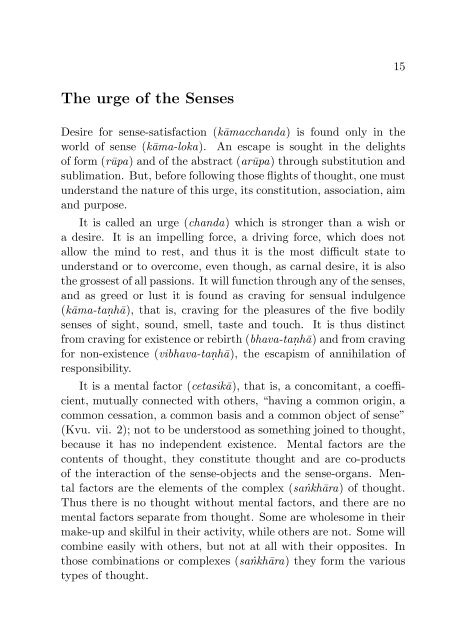Agony and Ecstasy
A comparative study of the five hindrances, together with the five states of concentration or mental absorption.
A comparative study of the five hindrances, together with the five states of concentration or mental absorption.
You also want an ePaper? Increase the reach of your titles
YUMPU automatically turns print PDFs into web optimized ePapers that Google loves.
15<br />
The urge of the Senses<br />
Desire for sense-satisfaction (kāmacch<strong>and</strong>a) is found only in the<br />
world of sense (kāma-loka). An escape is sought in the delights<br />
of form (rūpa) <strong>and</strong> of the abstract (arūpa) through substitution <strong>and</strong><br />
sublimation. But, before following those flights of thought, one must<br />
underst<strong>and</strong> the nature of this urge, its constitution, association, aim<br />
<strong>and</strong> purpose.<br />
It is called an urge (ch<strong>and</strong>a) which is stronger than a wish or<br />
a desire. It is an impelling force, a driving force, which does not<br />
allow the mind to rest, <strong>and</strong> thus it is the most difficult state to<br />
underst<strong>and</strong> or to overcome, even though, as carnal desire, it is also<br />
the grossest of all passions. It will function through any of the senses,<br />
<strong>and</strong> as greed or lust it is found as craving for sensual indulgence<br />
(kāma-taṇhā), that is, craving for the pleasures of the five bodily<br />
senses of sight, sound, smell, taste <strong>and</strong> touch. It is thus distinct<br />
from craving for existence or rebirth (bhava-taṇhā) <strong>and</strong> from craving<br />
for non-existence (vibhava-taṇhā), the escapism of annihilation of<br />
responsibility.<br />
It is a mental factor (cetasikā), that is, a concomitant, a coefficient,<br />
mutually connected with others, “having a common origin, a<br />
common cessation, a common basis <strong>and</strong> a common object of sense”<br />
(Kvu. vii. 2); not to be understood as something joined to thought,<br />
because it has no independent existence. Mental factors are the<br />
contents of thought, they constitute thought <strong>and</strong> are co-products<br />
of the interaction of the sense-objects <strong>and</strong> the sense-organs. Mental<br />
factors are the elements of the complex (saṅkhāra) of thought.<br />
Thus there is no thought without mental factors, <strong>and</strong> there are no<br />
mental factors separate from thought. Some are wholesome in their<br />
make-up <strong>and</strong> skilful in their activity, while others are not. Some will<br />
combine easily with others, but not at all with their opposites. In<br />
those combinations or complexes (saṅkhāra) they form the various<br />
types of thought.

















